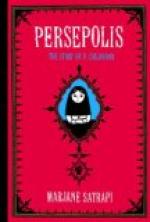Patrasche had lain quiet countless hours watching its gradual creation after the labor of each day was done, and he knew that Nello had a hope—vain and wild perhaps, but strongly cherished—of sending this great drawing to compete for a prize of two hundred francs a year which it was announced in Antwerp would be open to every lad of talent, scholar or peasant, under eighteen, who would attempt to win it with some unaided work of chalk or pencil. Three of the foremost artists in the town of Rubens were to be the judges and elect the victor according to his merits.
All the spring and summer and autumn Nello had been at work upon this treasure, which, if triumphant, would build him his first step toward independence and the mysteries of the art which he blindly, ignorantly, and yet passionately adored.
He said nothing to any one: his grandfather would not have understood, and little Alois was lost to him. Only to Patrasche he told all, and whispered, “Rubens would give it me, I think, if he knew.”
Patrasche thought so too, for he knew that Rubens had loved dogs or he had never painted them with such exquisite fidelity; and men who loved dogs were, as Patrasche knew, always pitiful.
The drawings were to go in on the first day of December, and the decision be given on the twenty-fourth, so that he who should win might rejoice with all his people at the Christmas season.
In the twilight of a bitter wintry day, and with a beating heart, now quick with hope, now faint with fear, Nello placed the great picture on his little green milk-cart, and took it, with the help of Patrasche, into the town, and there left it, as enjoined, at the doors of a public building.
“Perhaps it is worth nothing at all. How can I tell?” he thought, with the heart-sickness of a great timidity. Now that he had left it there, it seemed to him so hazardous, so vain, so foolish, to dream that he, a little lad with bare feet, who barely knew his letters, could do anything at which great painters, real artists, could ever deign to look. Yet he took heart as he went by the cathedral: the lordly form of Rubens seemed to rise from the fog and the darkness, and to loom in its magnificence before him, whilst the lips with their kindly smile seemed to him to murmur, “Nay, have courage! It was not by a weak heart and by faint fears that I wrote my name for all time upon Antwerp.”
Nello ran home through the cold night, comforted. He had done his best: the rest must be as God willed, he thought, in that innocent, unquestioning faith which had been taught him in the little gray chapel amongst the willows and the poplar-trees.




